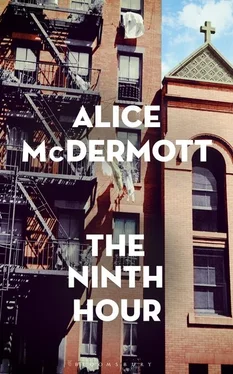There was another silence. His father was crying.
It all would have been too terrible, his own fear, his father’s sorrow, the cats yowling in some distant yard, the face of the old man at his window, if his mother’s voice hadn’t, at last, broken the spell.
“You did,” she said. He recognized her tone: the smooth voice richly amused: the end of the argument. “But love’s a tonic, Michael, not a cure. He was a bastard still.”
* * *
TWO WEEKS LATER a letter came from Aunt Rose. Beautifully composed—the lines written straight in black India ink and the handwriting, Spencerian script, so beautiful, their father called the girls to admire it before he read out what the letter had to say. Aunt Rose was very sorry that he had not come into the house after his father’s funeral. She had not anticipated the depth of his anger. Righteous anger, she said, to be sure. My brother was an unhappy man, she said. Weighed down all his life by the burden of gratitude.
Gratitude, their father pointed out, glancing at their mother. “A monkey on his back.”
Now, the letter said, Red Whelan was gone. She was composing this in his attic room, which was full of his absence. She had lived out her life at his side, she said, and she had done her duty gladly. She had no complaints to make. She had been his companion through the years and he hers. Now she was alone. One generation passes away, she wrote. And then she gave their father instructions to contact a lawyer on Water Street. In reparation for their estrangement, she was giving him everything his father had left her. She would move out of the house, take an apartment in town. She would make do on what she and Red Whelan had saved together over these many years. She asked only that he write to her now and then. She said she would do the same. She said she would pray for him and his family every morning and every night for the rest of her days.
Liz Tierney said, “She’s looking for someone to take care of her when she grows feeble.”
Wasn’t she the soothsayer? our father said.
Four months later, the family moved again. This time to a three-story house on Second Street. Their own home, purchased with the inheritance. It was a row house, nothing pretty, but five bedrooms—five. One for the two boys, one for the twins, one for the two younger girls. A wide bedroom for the parents, and, after all that spreading out, an empty bedroom left over, suitable for a boarder or a guest.
Suitable for Sally when she came to the door, late in the afternoon of the day she returned from Chicago. Beside her was the same rattan suitcase she had carried on the train, containing still the four chemises, six pairs of stockings, three muslin nightgowns without embroidery or decoration—the immaculate clothes that were to bring her to her new life.
Behind her stood Sister Lucy, who could insist.
WITH OLD AUNT ROSE ensconced in our attic, Sister Jeanne raised her eyes to the ceiling. Here’s a story, she told us.
This happened in France, in the last century. Jeanne Jugan was a kind woman who worked in the homes of the wealthy. One day, she came across a blind widow who had been put out on the street by her family. Put out on the street to die. Jeanne Jugan took the old woman to her own home, bathed her and fed her. She tucked the old lady into her bed and moved a pallet to the attic just above her head, where Jeanne Jugan slept within earshot of the poor soul.
Not long after that, Jeanne Jugan came upon another old woman who had been abandoned on the street and she took that woman in, too. And then another. And another.
Life was very hard for the old in those days. For poor widows especially. Who needed them? The small and the weak and the old. They got in the way of rushing, robust life, see? They were a pain in the neck. Always frail and sick. So people asked themselves, Who needs them?
Word got out, and people around the town began to bring their old folks to Jeanne Jugan. But there are always as many good people as there are bad. Better believe it. Soon other women who were as kind as Jeanne heard about the work she was doing and asked if they could help her. Some of these good women moved into Jeanne’s attic, too, so they would be available any time of the day or night. The community expanded. The number of old folks who were cared for grew and grew.
Jeanne Jugan went to the priest. She asked if the women could form a religious community of their own, to help guide their lives as they did this good and difficult work. They held a meeting in Jeanne’s attic and there they drew up their plan to become the Little Sisters of the Poor.
Every day, Jeanne put her basket over her arm and went out to collect food and money for her people. She would never take no for an answer, see? One rich man got so angry at her persistence—Sister Jeanne waved a fist in the air, imitating him—he punched her right in the face. Knocked her down.
When she got up again, she said, “Yes, but my ladies are still hungry.” Then he gave her all the money he had.
Whenever people said to Jeanne Jugan, “Oh good Lord, Sister, I gave you money yesterday,” she said, “But my ladies are hungry again today.”
Jeanne Jugan became famous. The President of France gave her a gold medal for her good work, and what do you think she did? She melted it down and used it to buy a bigger house for her ladies.
Sister Jeanne said, I heard this story from my spiritual advisor when I was a young nun: One day, Charles Dickens came to see Jeanne Jugan. Maybe he had read about her in the papers, I don’t know. But what do you think she said to the guy?
We couldn’t answer.
She said he should put his money where his mouth is. So he gave her a big donation.
And then he wrote somewhere or other that she was the holiest person he had ever met. Isn’t that something?
We said it was something.
But all the while good Jeanne Jugan was busy doing her work, the priest who had advised her was off scheming. He went to Rome and told them he was the one who started the order. He said he was the one who found the first blind widow on the street and he was the one who told Jeanne Jugan to take care of her. He was the one who invited the other women to help out. And the priests in Rome fell for it. They made him the head of the order. And they put up a plaque on Jeanne Jugan’s house that said HERE FATHER SO-AND-SO FOUNDED THE LITTLE SISTERS OF THE POOR.
And that wasn’t the worst of it, Sister Jeanne said.
There was a very young nun in the order, and this priest liked her better than Jeanne Jugan. He put her in charge and told Jeanne she could no longer go around with her basket. She could just stay inside, do some housekeeping, train some novices. Jeanne said to the priest, “You have taken my work from me.” And then she said, “But I gladly give it to you.” And that’s how she lived the rest of her life. Staying inside.
As the years went by, people forgot that Jeanne was the founder of the order.
But, listen, Sister Jeanne said, life is like the blink of an eye.
The young nun the lying priest had put in charge became an old woman herself, and as death approached, she knew she had to set the record straight. An investigation was made, and sure enough, the plaque on Jeanne’s house was changed to say HERE JEANNE JUGAN FOUNDED THE LITTLE SISTERS OF THE POOR.
Sister Jeanne sat back in her chair, the light of the fading afternoon just behind her. We sat back, too, satisfied, as children will be, at any tale that is resolved with the restoration of order. Children who know, without instruction or study, what is fair.
But then we saw that old Sister Jeanne was laughing inside her bonnet. It’s all silliness, she said. Don’t you see?
Читать дальше










